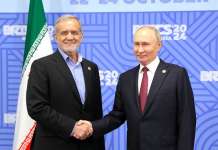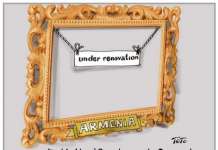By Suren Sargsyan published in The Armenian Mirror of Spectator
Throughout its history, Armenia has been a captive of its own geographical position as well as the interests and conflicts of the big players in its neighborhood. For centuries, due to these circumstances, Armenia lost not only territories but also statehood, recovering it with difficulty only due to the collapse of the USSR. If through centuries Armenia was divided between different regional empires, losing land and subjected to massacres and genocide, then in the modern era, Armenia has again appeared at the center of the interests of regional and global players, such as Russia on one side and the West on the other.
Today, yet again, this young state faces the loss of its own statehood and territories due to the same geopolitical reasons, plus the lack of effective governance as well as a reliable national security system and strategy. Modern Armenia is now challenged not only by neighboring Turkey but also by Azerbaijan. The strained relations between Iran and the West, Iran and Israel, and, as already mentioned, the West and Russia, are extremely disturbing. If we look at history, we will see that, as a result of conflicts between global players, Armenia has always lost, and its territory has been divided at various stages of its history between Iran, Turkey, Russia, etc.
As relations between the West and Russia are extremely tense currently, Armenia will be put to the test again. After the end of the Cold War, relations between Russia and the West appeared more or less settled, but they are now more tense than ever before, and the endless sanctions placed by the West highlight that reality. In the past, Armenia was not required to make a clear choice between Russia and the West; today, it is almost impossible to remain impartial, and any conflicting party expects a clear position from Armenia, including the demands of the West to join the sanctions applied against Russia.
We see that Armenia has to play a dangerous game and make a choice imposed on it. If Armenia chooses the Russian side, it will be punished by the West, and if it chooses the European direction and NATO, it will definitely be punished by Russia, as we witnessed in the scenarios of Ukraine and Georgia.
It is fairly clear what kind of tools can be used by the superpowers to punish Armenia, and today, as in the various stages of its history, Armenia again is losing territories and once again faces the loss of sovereignty. However, at this period of time, it is very difficult to make accurate predictions about future developments in Europe, and Armenia should advance only on one principle: to preserve statehood and territorial integrity. In the early 1990s, for the first time in the last centuries of its history, Armenia created statehood and was able to regain historical territories. But unfortunately, free Artsakh survived only for 30 years, failing due to the same old reasons plus the fact that the Armenian government was ready to hand Artsakh to Azerbaijan.
As already mentioned, Armenia faces a difficult choice. It may lose sovereignty and territory, and it may again be subject to massacres and ethnic cleansing. There is noticeable pressure on Armenia to decide whether it remains in the Russian orbit or wants to look towards Europe and NATO. Whether Armenia wants to leave the Eurasian Economic Union (EAEU) and the Collective Security Treaty Organization (CSTO) and turn its face to the EU is still an unresolved question. Making this kind of decision requires weighty arguments, deep calculations, complex and multi-step combinations, geopolitical forecasts, a clear strategy, and, of course, political will.
In other words, Armenia has entered the stage of calculations and deep analysis. Whether Yerevan has such abilities and skills, I leave to the judgment of the readers, but it is obvious that it should make these calculations on its own without relying on any other party, because any other player will offer solutions based on its own interests, not those of Armenia.
In my next article, I will discuss whether the West itself is ready to accept Armenia as a family member.












